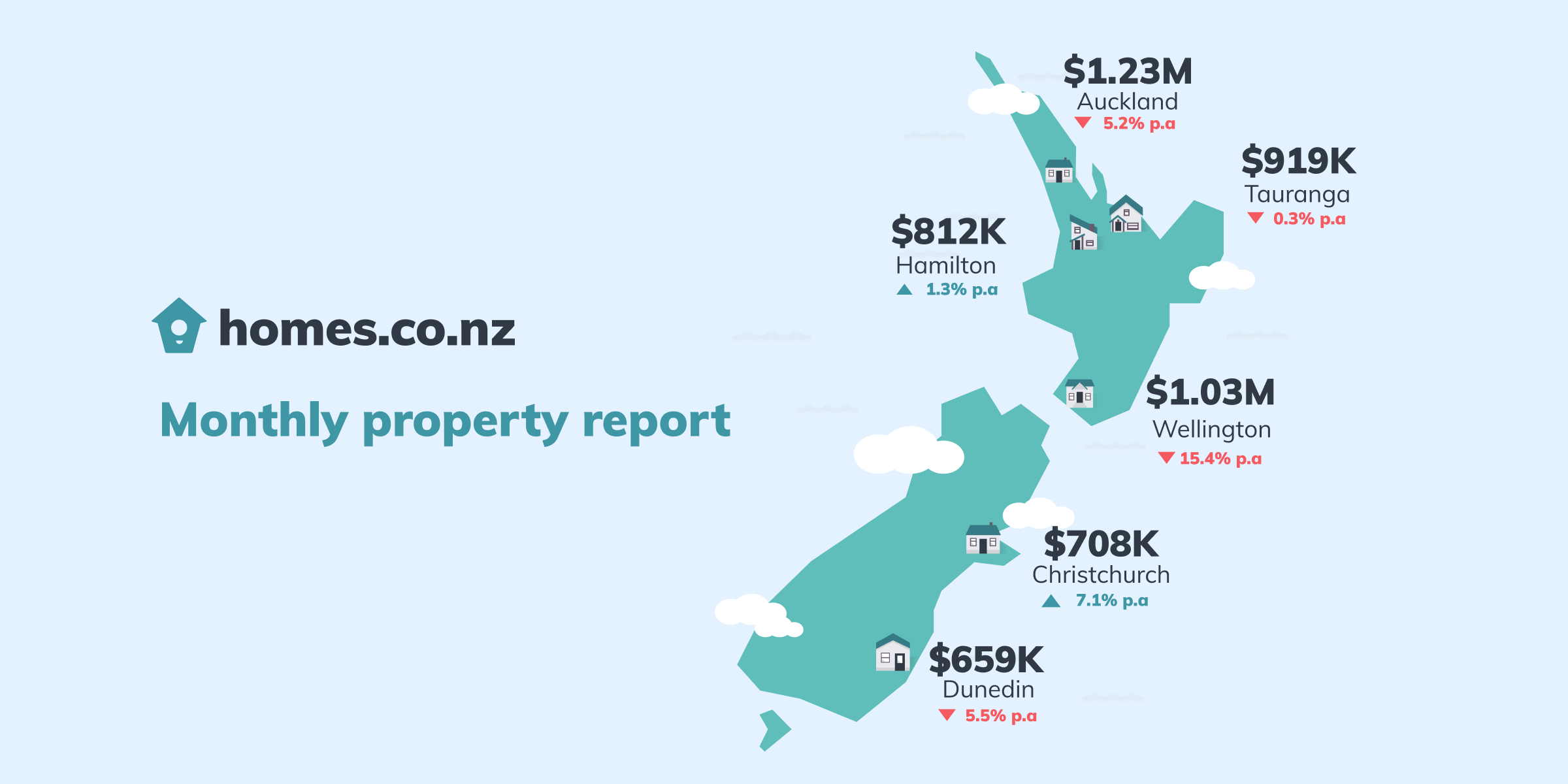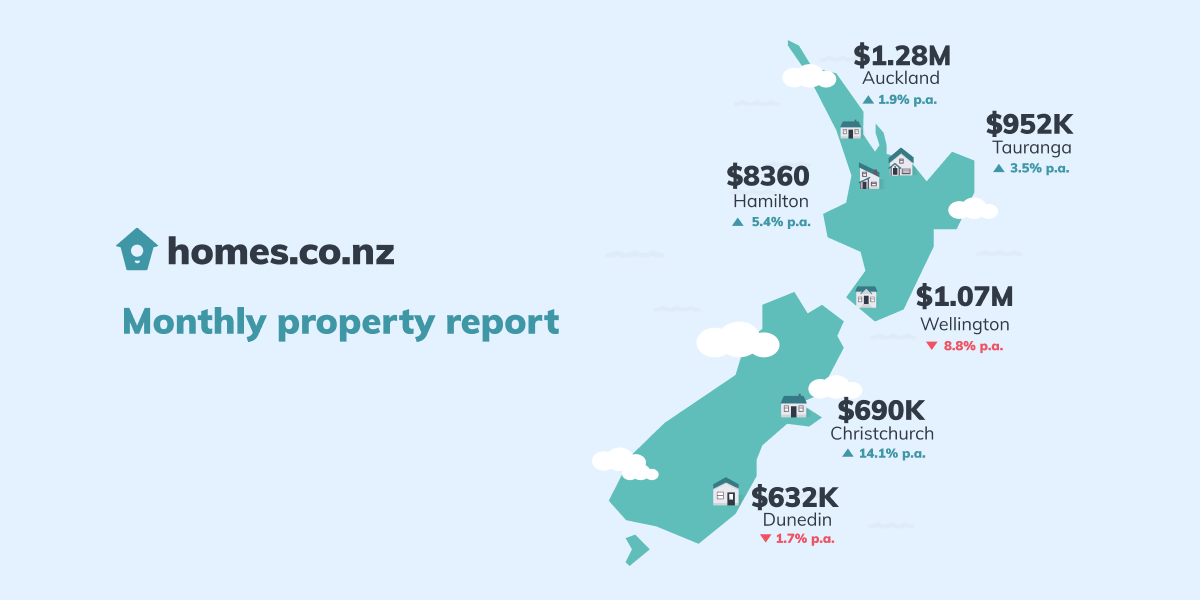This month, we’re hearing from Dot Loves Data Government Director, Justin Lester, who’s analysis shows just how out of reach a house deposit is for many Kiwis around the country.
These insights may not provide solace to those looking for their first home, but the generational shift towards renting does prompt the question of where to from here?
Home ownership increasingly unobtainable in many parts of New Zealand
Dot Loves Data has undertaken new rental and house price analysis in partnership with Homes.co.nz, which shows that the Kiwi dream of home ownership is turning into a nightmare for many young New Zealanders.
New Zealand’s home ownership levels peaked in 1991 at 74% and have continued on a steady decline since, dropping to 64.5% in 2018. Based on current trends, Dot Loves Data expects home ownership levels to drop even further in coming years and, given the disparity between house prices and wage levels, will likely dip beneath 60% within the next decade.
There is good news for landlords however, with renters seeking out good quality homes they can make their own. Renters have shown they are willing to pay extra for quality rentals and attentive landlords.
More than 20 Years to Save for a Home Deposit
Dot Loves Data calculated the number of years New Zealanders will need to save in order to have enough funds to pay for a home deposit.
The average Auckland household will now spend up to 16 years saving for a home deposit. Wellingtonians will take 13 years, Dunedin-ites 14 years, while Christchurch is currently the most affordable of the main centres, at 10 years.
To reach our estimates we have assumed the average household will be able to save 20% of their earnings, after deducting rental costs. We have used October 2021 house price data from Homes.co.nz and median income levels from Statistics NZ.
According to Dot Loves Data Government Director, Justin Lester, “New Zealand is fast becoming a nation of ‘parents-have’ versus ‘parents-have not’. If parents can afford to support their children with a house deposit, then they can take a step up the housing ladder. If they can’t, their offspring might miss out. Unfortunately it’s not currently enough to get a good job, work hard and save because house price inflation has pushed purchase prices outside of the reach of young people. Without parental support, home ownership is becoming almost unobtainable.”
As a result of these increases, which surpass the New Zealand wage inflation figure of 2.1% per annum, the time it takes for New Zealand families to save for a home deposit has surpassed 20 years in multiple locations.
Rental prices surging
Nationally rental costs have surged by 17% over the past three years.
Wellington currently has the highest median rental prices in New Zealand followed by Auckland, Porirua, Tauranga and Queenstown. The median rental price in Wellington is $561 per week. In Auckland it is $559 per week, with Porirua close behind on $556. In the main centres renters are seeking quality homes, with the percentage increase in rental returns higher for upper quartile rental homes.
Wellingtonians spend 24% of their income on rent. Aucklanders spend 28%, due to lower income levels, than the Capital. Rental affordability is at its worst in lower income areas of New Zealand. In Horowhenua, due to low income levels, residents will pay a chunky 40% of their income on rent.
Meanwhile, Aucklanders moving to or purchasing a holiday home in outlying provinces such as Thames-Coromandel and Kaipara means residents of both areas will pay 37% of their income on rent.
| District | % of Income Spent on Rent |
| Horowhenua | 40% |
| Thames-Coromandel | 37% |
| Kaipara | 37% |
| Far North | 36% |
| Tauranga | 35% |
| Napier | 35% |
The most affordable rental accommodation is found in Southland District, where residents will pay on average 19%, Mackenzie District where they’ll pay 20% of their income on rent, and Selwyn on 21%, despite its high nominal rental costs, because it also has high household income levels.
What’s driving the rental surge?
The confluence of several factors are pushing rental costs up. Recent changes to Healthy Homes standards, the removal of tax deductibility provisions, low rental yields due to high house prices, a supply shortage and rising interest rates have each played a part. Says Lester, “With increasing costs, landlords have increased rental prices, leading to a vicious, rather than virtuous cycle for renters and landlords. With interest rates predicted to climb further, it will be a difficult problem to solve.”
Monthly Property Update
The homes.co.nz Monthly Property Update is generated using homes.co.nz’s December 2021 HomesEstimates, providing an up-to-date perspective on house values around New Zealand.
Trends in our Main Cities
Growth in the property market appears to be slowing with only modest increases in our Median HomesEstimate seen across all of our main centres. The exception was Dunedin that has decreased slightly to have a median HomesEstimate of $680K. After being valued more than Christchurch for the last 2 years, the median value in Dunedin has now fallen below it’s southern neighbour (although by a mere $600!)
NZ’s First Home Buyer HomesEstimate
The “First Home Buyer HomesEstimate” is homes.co.nz’s estimate of what a typical first home may cost. It is calculated to be the lower quartile HomesEstimate in a town.
How do we calculate these figures?
The homes.co.nz Monthly Property Update is generated using homes.co.nz’s monthly HomesEstimates and provides an up-to-date perspective on house values around New Zealand. By valuing the entire housing stock, the homes.co.nz Monthly Property Update can compare median values from month to month in a consistent and reliable way. Our HomesEstimates are calculated for almost every home in New Zealand by an algorithm that identifies the relationships between sales prices and the features of a property.
Established in 2013, homes.co.nz is NZ’s first free property information portal eager to share free property information to New Zealanders.



